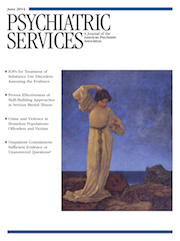This Month’s Highlights
Two AEB Series Reviews
Victimization in Homeless Populations
Preventing Depression Among Older Adults
Outpatient Commitment: An Ongoing Debate
Information & Authors
Information
Published In

Cover: Griselda, by Maxfield Parrish. © Copyright 2014 National Museum of American Illustration™, Newport, Rhode Island. Photos courtesy of Archives of the American Illustrators Gallery™, New York City.
History
Authors
Metrics & Citations
Metrics
Citations
Export Citations
If you have the appropriate software installed, you can download article citation data to the citation manager of your choice. Simply select your manager software from the list below and click Download.
For more information or tips please see 'Downloading to a citation manager' in the Help menu.
View Options
View options
PDF/EPUB
View PDF/EPUBLogin options
Already a subscriber? Access your subscription through your login credentials or your institution for full access to this article.
Personal login Institutional Login Open Athens loginNot a subscriber?
PsychiatryOnline subscription options offer access to the DSM-5-TR® library, books, journals, CME, and patient resources. This all-in-one virtual library provides psychiatrists and mental health professionals with key resources for diagnosis, treatment, research, and professional development.
Need more help? PsychiatryOnline Customer Service may be reached by emailing [email protected] or by calling 800-368-5777 (in the U.S.) or 703-907-7322 (outside the U.S.).
